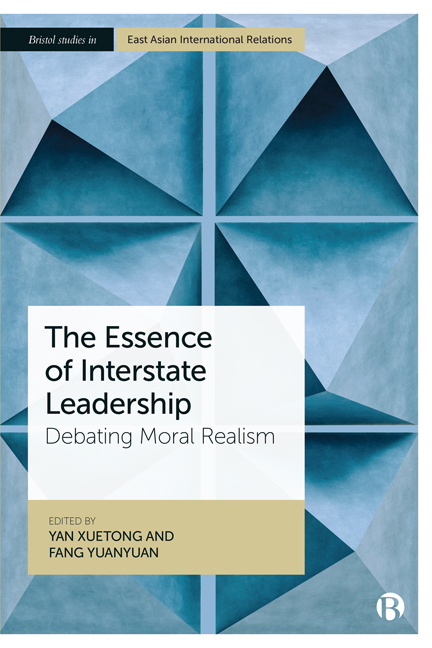Book contents
- Frontmatter
- Contents
- List of Abbreviations
- Notes on Contributors
- Preface
- 1 Interstate Leadership, Moral Realism, and their Critics
- 2 IR Moral Realism as a Universal Theory
- 3 Moral Realism as an Alternative Approach to the Agent-Structure Problem
- 4 Prospects, Promise, and Limitations of Moral Realism
- 5 Ideal Morality and Realist Interest of Moral Realism
- 6 The Conception of Morality in Moral Realism
- 7 Moral Realism and Hegemonic Transition
- 8 Innovation of Moral Realism and Dialogue with It
- 9 Moral Realism and Sino-American Relations
- 10 Moral Realism on Interstate Leadership in Response to Critics
- Appendix 1 Written Discussion between Rajesh Rajagopalan and Yan Xuetong
- Appendix 2 ‘Chinese School’ as an Inappropriate Title
- Selected Bibliography
- Index
Appendix 1 - Written Discussion between Rajesh Rajagopalan and Yan Xuetong
Published online by Cambridge University Press: 18 January 2024
- Frontmatter
- Contents
- List of Abbreviations
- Notes on Contributors
- Preface
- 1 Interstate Leadership, Moral Realism, and their Critics
- 2 IR Moral Realism as a Universal Theory
- 3 Moral Realism as an Alternative Approach to the Agent-Structure Problem
- 4 Prospects, Promise, and Limitations of Moral Realism
- 5 Ideal Morality and Realist Interest of Moral Realism
- 6 The Conception of Morality in Moral Realism
- 7 Moral Realism and Hegemonic Transition
- 8 Innovation of Moral Realism and Dialogue with It
- 9 Moral Realism and Sino-American Relations
- 10 Moral Realism on Interstate Leadership in Response to Critics
- Appendix 1 Written Discussion between Rajesh Rajagopalan and Yan Xuetong
- Appendix 2 ‘Chinese School’ as an Inappropriate Title
- Selected Bibliography
- Index
Summary
A book review of Yan Xuetong's Leadership and the Rise of Great Powers (2019)
Rajesh Rajagopalan
First published in India Quarterly: A Journal of International Affairs 75, no. 3 [2019]: 405– 9
Realism is dying a slow death in its current motherland, the US. It has not been popular in Europe or other parts of the world for quite some time, and America seems set to follow the same trend. Poisoned by Kenneth Waltz's expectation of the inevitable recurrence of balances of power, prominent realists (including, while he was alive, Waltz himself) have spent the better part of the last three decades looking for an elusive counter to America's unipolar power. More radical proponents of the ‘defensive’ realism that Waltz spawned have gone so far as to suggest that the security dilemma – one of the central tenets of realism – can be overcome through reassurance. It has become increasingly difficult to distinguish realism from liberalism in American international relations (IR) scholarship. While there are honourable exceptions to this trend, it is difficult not to despair at the state of realism as a theory.
If realism is dying in America, it seems to be prospering in China, as others have also noted. Yan Xuetong's latest book, Leadership and the Rise of Great Powers, is a good example. Understandably, given China's rise, Yan's focus is on how a rising power can catch up and displace the established dominant power. Much of the literature on power transitions, and indeed much of realist theory, take for granted that uneven growth of wealth in different states over time leads to the rise of new powers. Because realist theory largely refuses to look inside states, preferring only to examine how states interact with others given this uneven growth, they ignore the question of why states grow at this uneven pace to begin with. Even the latest variant within realism, neoclassical realism, which explicitly focuses on domestic variables to understand how states cope with international pressures, do not examine this question.
- Type
- Chapter
- Information
- The Essence of Interstate LeadershipDebating Moral Realism, pp. 204 - 215Publisher: Bristol University PressPrint publication year: 2023



